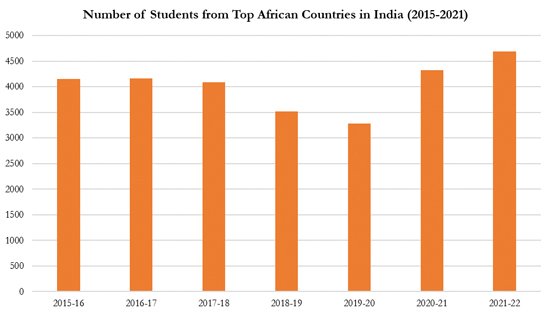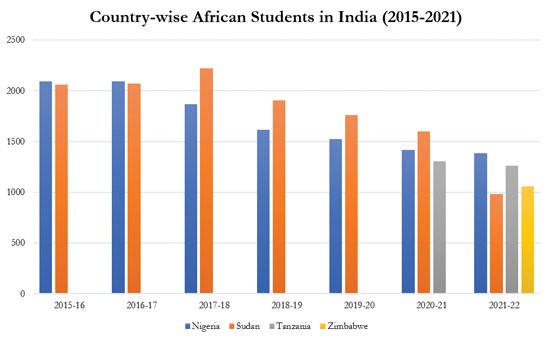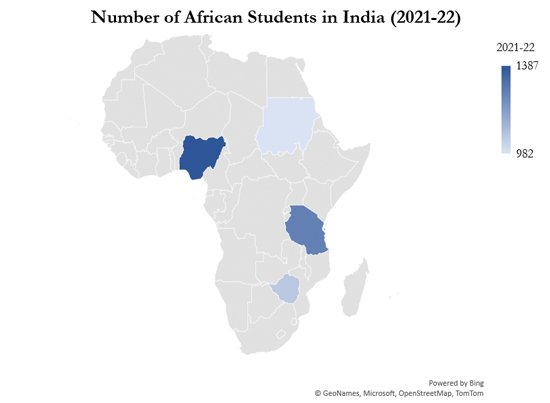
In the evolving landscape of global development, South-South Cooperation (SSC) has gained momentum as a collaborative approach among the countries of the Global South to address shared challenges. Rooted in mutual learning and partnership, SSC promotes the exchange of knowledge, technical expertise, and resources to achieve inclusive and sustainable growth.
India has emerged as a key player in SSC, strengthening its relations with partner countries, particularly in Africa,through educational exchange, capacity-building, and development cooperation. This partnership is shaped by long-standing and historic relations and a shared vision for inclusive development, youth empowerment, and skill enhancement. The Goal 2 of the African Union’s 2063 Agenda, “Well educated citizens and a skills revolution underpinned by science, technology, and innovation,” has education and skills central to its regional strategy(AGENDA 2063: The Africa We Want, 2022). Notably, India’s educational initiatives align closely with Africa’s priorities in human capital development.
Challenges faced by Africa:
Nevertheless, Africa faces challenges in meeting its education and workforce goals. With its population expected to yield a workforce of 1.25 billion by 2050(United Nations Economic Commission for Africa, 2024), the continent must address persistent gaps in access and quality of education. UNESCO estimates that over 34 million children in Africa remain out of school. Shortages of trained teachers, inadequate infrastructure, and regional disparities further complicate the crisis.
India’s engagement in Africa is not simply assistance, but a shared responsibility, supporting Africa’s aspiration to build resilient, knowledge-based societies. As both of them navigate a rapidly changing global economy, their collaboration stands as a model for how education-centred South-South partnerships can drive meaningful and sustainable development.
India’s Educational and Skill Development Initiatives for Africa:
India has emerged as a significant partner in building Africa’s human capital through avariety of education and skill development initiatives. These efforts reflect a deep commitment to SSC and highlight India’s role in advancing inclusive and equitable learning opportunities across the Global South.
Besides, annually, the C V Raman Fellowship promotes scientific and technological collaboration by supporting 1000 African researchers. In the Third India-Africa Forum Summit held in 2015, Prime Minister Narendra Modi pledged 50,000 scholarships, of which 32,000 have already been awarded, indicating bilateral academic engagement(Sawahel, 2021).
African Students in India:
At present, more than 25,000 (approx.) African students are enrolled in Indian institutions. Countries such as Nigeria, Sudan, Tanzania, and Zimbabwe are among the largest contributors to this growing student community in India. African countries consistently rank among the top source countries of international students in India. Except during the COVID-19 pandemic, 2015 onwards, there has been a rise in the inbound mobility of African students in India. Factors such as affordable education, instruction in English, diverse academic courses, cultural diversity, strong digital platforms and emphasis on practical skills have made India an attractive destination for African students.

Source: Graph generated by the author using the data points from the All-India Survey of Higher Education

Source: Graph generated by the author using the data points from the All-India Survey of Higher Education

Source: Graph generated by the author using the data points from the All-India Survey of Higher Education
India’s educational engagement with Africa is a strategic investment in long-term partnerships grounded in mutual benefit and a collective vision for sustainable development. The development of Africa’s human resources is crucial for India’s broader geopolitical and economic outreach. With Africa emerging as a global growth center and home to world’s youngest population, building educational linkages ensures India remains a trusted partner in the continent’s future. These relationships nurture goodwill, strengthen India’s diplomatic presence and create pathways for trade, investment and cultural exchange.
Notably, India’s approach to educational cooperation reflects a form of soft power rooted in solidarity rather than superiority. Unlike transactional models of engagement, India’s efforts are embedded in capacity-building, mutual respect and responsiveness to Africa’s development priorities. By aligning its initiatives with Africa’s goals, India showcases its commitment to enabling Africa’s growth.
India’s model of education diplomacy strengthens its international outlook as a responsible and responsive global actor. The educational initiatives by India contribute to long-term people-to-people ties, who can become the cultural ambassadors and future leaders who view India as a partner and not just a provider. It reinforces the idea that SSC can be a powerful alternative to traditional aid paradigms, focusing on empowerment rather than dependence.
The India-Africa partnership in education and skills is not merely an exchange of knowledge;it is a shared journey towards an inclusive, resilient and future-oriented society. It is a strategic cornerstone in building a balanced and multipolar global order where the Global South claims its rightful place as an equal partner in shaping the future.
References:
(2022). AGENDA 2063: The Africa We Want. The African Union Commission.
ICCR. (2025, April). From Annual Reports: https://iccr.gov.in/annual-reports
ITEC. (2025, March). From Regional Reports: https://www.itecgoi.in/itec_dashboard_All_user
Ministry of External Affairs. (2019, October 9). From Official Launch of e-VidyaBharti and e-ArogyaBharti Project by External Affairs Minister: https://www.mea.gov.in/press-releases.htm?dtl/31928/Official+Launch+of+eVidyaBharti+and+eArogyaBharti+Project+by+External+Affairs +Minister+October+09+2019%20
Saran, S. (2012). India and Africa: Development Partnership. Research and Information System for Developing Countries.
Sawahel, W. (2021, November). University World News. From India sharpens its knowledge diplomacy focus on Africa: https://www.universityworldnews.com/post.php?story=20211111160337915
United Nations Economic Commission for Africa. (2024, July 12). From As Africa’s Population Crosses 1.5 Billion, The Demographic Window Is Opening; Getting The Dividend Requires More Time And Stronger Effort: https://www.uneca.org/stories/%28blog%29-as-africa%E2%80%99s-population-crosses-1.5-billion%2C-the-demographic-window-is-opening-getting
Leave a Reply